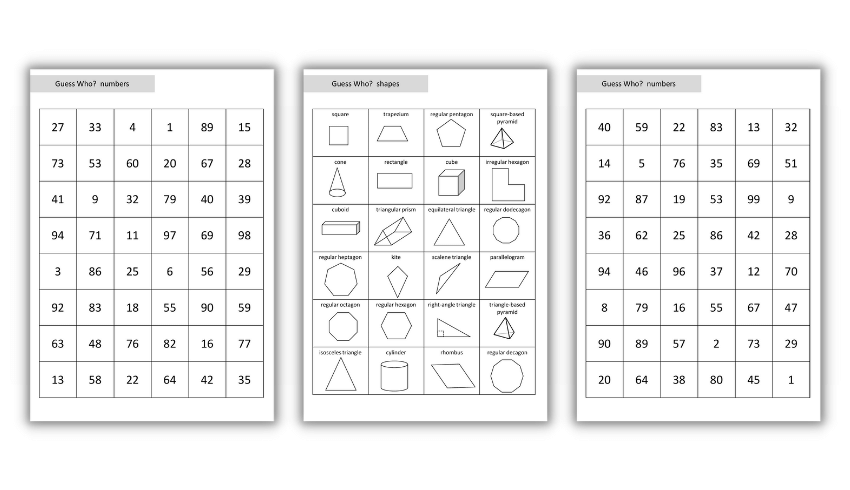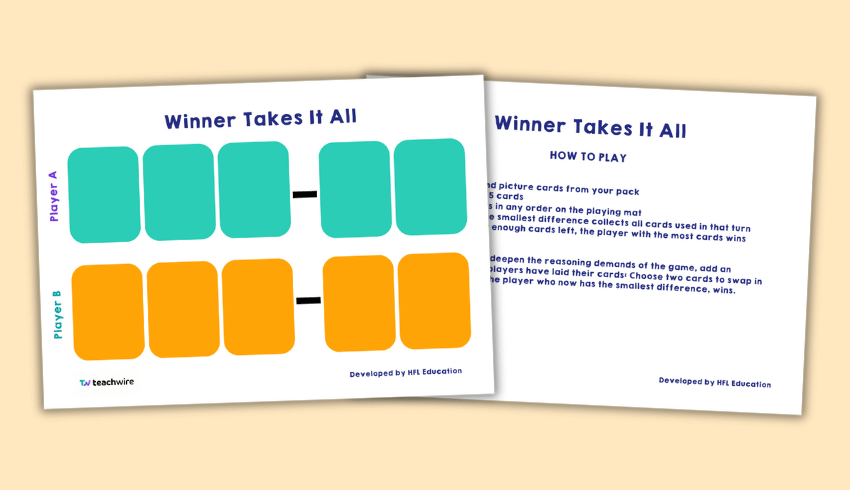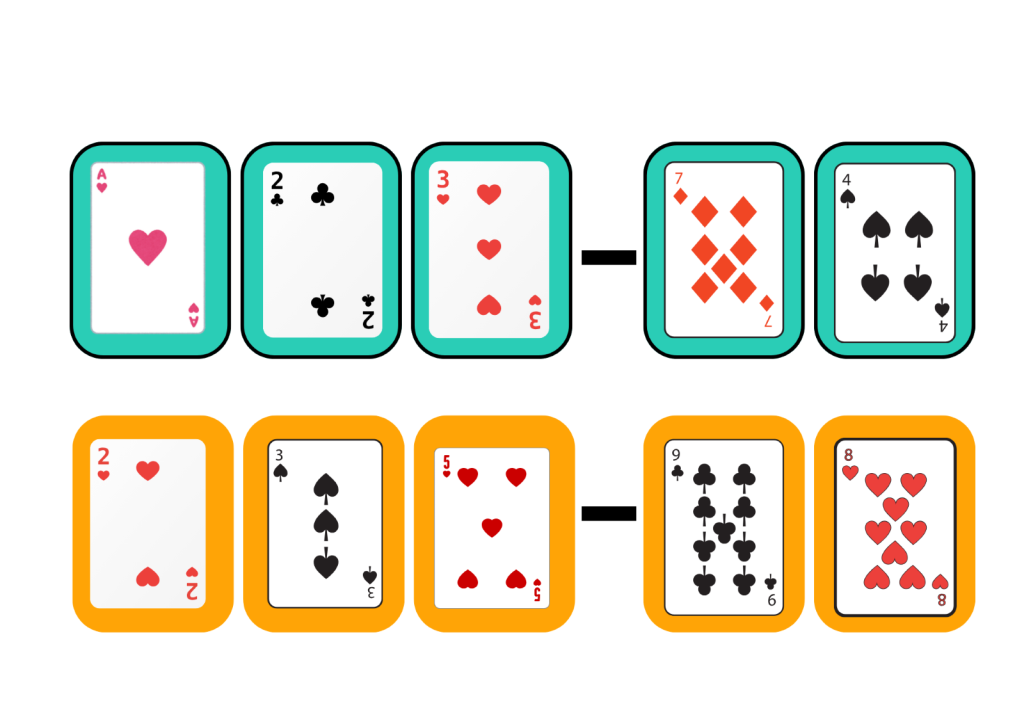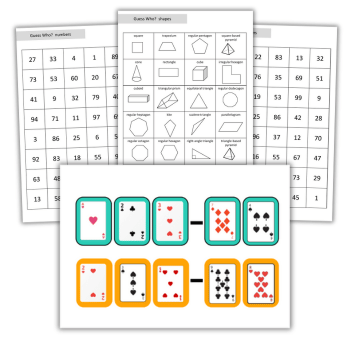If you model KS2 maths games well, children will become engrossed in the game and therefore immersed in the learning.
You can observe and interact with pupils in the moment to determine the security of their understanding and level of efficiency.
Alternatively, take a guided group for some pinpointed teaching to move their learning on while they play the following KS2 maths games…
Guess Who?

Play this special version of the classic game Guess Who by downloadng and printing out these sheets. Then ask pupils to get into pairs and give an identical sheet to each pupil in the pair. Next, trim round a third identical sheet to make a deck of cards.
In a similar way to the classic board game, each student needs to select a card and keep it out of view. Then their opposing player has to try and figure out what is on the card, only asking ‘yes’ or ‘no’ questions.
Pupils can put counters on numbers that have been discounted, or cross them out. For older pupils you can introduce the idea of multiples, factors, prime and composite numbers. There’s also a shape version of the game included in this download.
If you want to play this game with KS1 children, simplify the game by asking pupils to rule out even/odd numbers or numbers larger/smaller than 50, for example.
Find the full instructions for this and other maths games KS2 ideas here.
Sarah Farrell is a KS2 teacher in Bristol who makes and shares resources online. Follow Sarah on Twitter at @SarahFarrellKS2 and see more of her work at mrsfclassroom.wordpress.com. Browse more times tables games.
Winner Takes It All

The aim of this game is to collect the greatest number of cards. Arrange five cards in any order on the playing mat. The player with the smallest difference collects all the cards used in that turn. When there aren’t enough cards left, the player with the most cards wins.
This game helps pupils develop fluency and is a great chance to help children move from inefficient counting strategies to efficient calculation. When calculating the difference between card values, children will rehearse key maths skills.
Observe them as they do this; it can be hugely enlightening. For instance, can you see your pupils making jottings or using formal written calculations? Are they counting on their fingers to add or take away?
Are they counting in other ways, such as nodding their heads or tapping their legs under the table? When you talk to the children, are they talking about base facts?
Can players explain that when calculating 13−4 they are moving through 13−3−1? Or even better, that they simply know that 13−4 = 9?
You can also check if pupils use rebalancing when taking away, such as calculating that the difference between 235−98 and 237−100 is the same.

After playing a few times, pupils may realise that the smaller the first number (the minuend) and the larger the second number (the subtrahend), the smaller the difference between the two.
Use sentence frames to get children thinking about these concepts during a game. Try these:
- If…then…
- I have noticed…
Inside this KS2 maths games download
- 2 x Guess Who? numbers sheets
- Guess Who? shapes sheet
- 100 grid for younger players
- Winner Takes It All playing mat and instructions
Benefits of playing KS2 maths games
Playing games in maths lessons means all pupils come out on top, even when they lose, explains Nicola Adams…
To the untrained eye, playing KS2 maths games may present as time away from delivering the curriculum, or missed learning time. But when planned and executed well, this couldn’t be further from the truth.
For one thing, you can’t underestimate the impact of fun when it comes to learning. And in plenty of KS2 maths games there is both an element of luck and an element of skill that will develop the more pupils play.
Play nice
When children play games, over time, they develop social skills. Those experienced with tabletop games may have already developed the ability to take turns, listen, and react appropriately when they win or lose. Some may not be so experienced; that’s where you come in.
When modelling a game, why not play a couple of ‘teacher vs class’ rounds under the visualiser? On your turn, voice your inner monologue out loud.
Why are you making each choice? What will you say if they beat you? What will your body language be like? What about if you win?
Gain insight
Observing and talking to children during games also highlights how they’re thinking, what skills and knowledge they already have, common errors and misconceptions, and what might need further teaching.
Provoke reasoning
Once children have played a few rounds of a game, we can often see that through repeated turns they have made generalisations and understood ‘rules’.
Talking to the children hopefully shows that their thinking has deepened, and that they’ve developed a strategy for gameplay.
Family fun
When pupils have played a KS2 maths game at school a few times, why not consider inviting families in for a gaming session along with their children?
Provide resources so they can continue this learning together at home. Alternatively, you could film a round of the game and share the recording along with the rules on your class webpage or app.
What about evidence?
Sometimes, we can feel under pressure to have evidence of learning in the children’s books. The question is, though, how we can make this both manageable and purposeful for our pupils. After all, that should be the rationale behind recording anything at all, right?
You could pause during a game to ask your children a question. This might be as a whole class, or even at a table or with a pair of players. Provide sentence structures to help pupils jot down ideas in their books, such as:
- Why did you make that choice? (I chose to… because…)
- What do you hope/predict is going to happen? (I think that..)
- Which strategy did you use? (I… because…)
- Can you think of another way of doing it? (I could…)
Alternatively, at the end of the game you could ask questions such as:
- What skill/strategy did you use? (I… because…)
- What did you/other players do well? (I noticed that…)
- If you played again, how might you play differently? (Next time, I could..).
- How could you change the game to make it easier/harder? (I would… because…)














